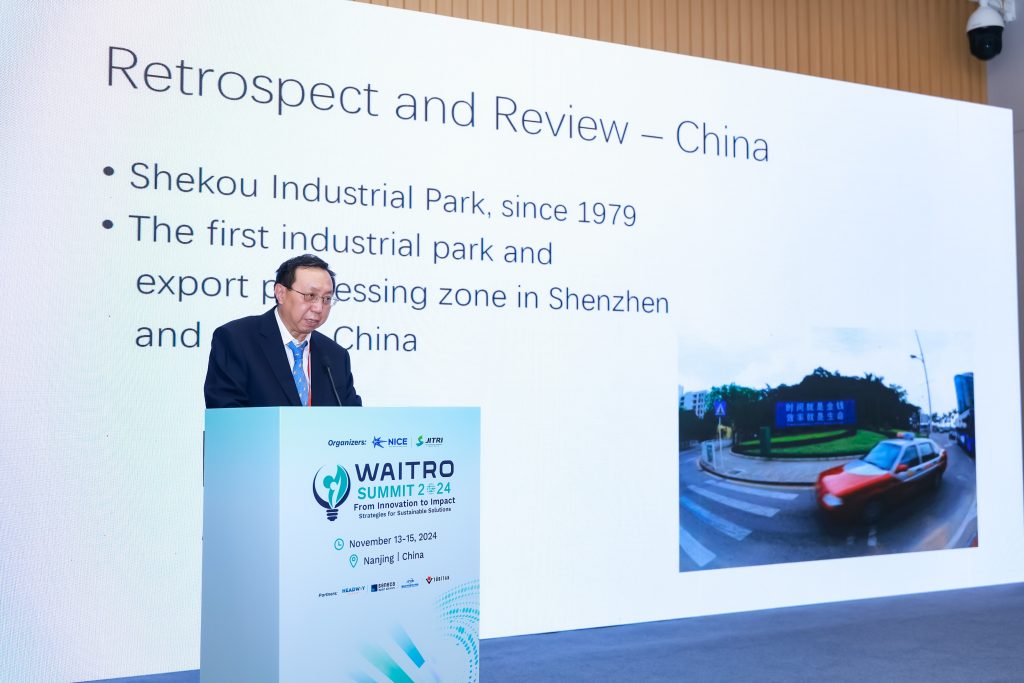18 Nov 2024
On 13 November 2024, the WAITRO 2024 Summit, hosted by the World Association of Industrial and Technological Research Organisations (WAITRO) and Jiangsu Industrial Technology Research Institute (JITRI)/Yangtze River Delta National Innovation Center par Excellence (NICE) was successfully held in Nanjing. More than 200 representatives from over 30 countries and regions, including the United States, Germany, Denmark, Australia, Turkey, South Africa, Belgium, Malaysia, and Jordan and so on, attended the event.

Figure 1: Opening Ceremony of the WAITRO 2024 Summit
On the afternoon of 13 November, the breakout session on Industrial Park Transformation and Changing Global Supply Chain was co-organised by Xi’an Jiaotong-Liverpool University (XJTLU). The forum brought together representatives from academia, industry, research institutions, and government to engage in in-depth discussions and exchanges on topics such as dynamic changes of global supply chain, integration into global production networks, industrial park transformation and governance, and business internationalisation and innovation. The breakout session featured keynote speeches and a roundtable discussion.

Figure 2: Breakout session
Dr. Yunqing Xu, Director of the University Research Centre for Urban and Environmental Studies at XJTLU, hosted the opening session. Dr. Xu highlighted that industrial parks, as highly efficient, innovative and impactful clusters, present strategic opportunities for the coupling with global production networks while also facing tremendous challenges such as green and smart transitions and sustained growth and development. She emphasised the need to focus on regional development trends and local characteristics, fostering collaboration and sharing within the global innovation family to explore impactful innovations and actions.

Figure 3: Dr. Yunqing Xu hosting the session
Professor Fei Ma, Associate Vice President of XJTLU, delivered an opening remark, presenting XJTLU's strategic approach to creating a diverse and international community by integrating researchers, investors, industry experts, and government actors. He highlighted the university's dedication to forming an innovation-driven "industry-education-research" ecosystem to support the modern industrial development of Jiangsu Province. Professor Ma underscored the importance of transforming innovation into a powerful tool for sustainable changes and expressed his gratitude to the summit organisers.

Figure 4: Professor Fei Ma addressing the opening
Dr. Bing Chen, Senior Associate Professor, Head of the Department of Urban Planning and Design at XJTLU’s School of Design, discussed the challenges and opportunities faced by industrial parks during their transformation. He highlighted the importance of regional development and global supply chain dynamics in shaping urban planning and design practices, expressing his anticipation of the opportunities for international and local collaboration that this summit will bring about.

Figure 5: Dr. Bing Chen delivering his message
Dr. Xue Han, Deputy Director of the Overseas Collaboration Division at the Yangtze River Delta National Innovation Center par Excellence (NICE), delivered a keynote speech on "Exploring the Innovation Ecosystem of NICE for Internationalization". Dr. Han outlined NICE's collaboration model of "external network building + internal ecosystem support," showcasing its achievements in establishing domestic and international presence, securing overseas project resources, promoting project implementation, and fostering joint research institutes.

Figure 6: Dr. Xue Han delivering her keynote speech
Professor Henry Wai-chung YEUNG, Honorary Professor at the Department of Geography, National University of Singapore, presented on "Restructuring of Global Production Networks and the Future of Industrial Parks in East Asia". As a leading scholar in global production networks and global economy, Professor Yeung shared insights into the trends shaping global industrial production and the strategic coupling and embedding processes of industrial parks within global production networks across various high-tech sectors. He also provided a regional system perspective on future policy and practice directions.

Figure 7: Professor Henry Wai-chung YEUNG delivering his keynote speech
Mr. Qining Chen, Chairman of Suzhou Industrial Park Planning and Consulting Co., Ltd., delivered a keynote on " Suzhou Industrial Park: A Case Study on 30 Years’ Continued Growth and Innovation". He detailed the park’s strategies across different stages, including foundational infrastructure development, high-tech industry focus, structural optimisation during transition phases, and experiences in exporting innovative "enclave" practices.

Figure 8: Mr. Qining Chen delivering his keynote speech
Dr. Jie Kuang, Research Fellow at Centre of Economic and Finance, School of Marxism, Tsinghua University, gave a keynote speech on "Development Trend and Governance System of Industrial Parks in the Context of Industry Chain Reconfiguration". Dr. Kuang pointed out the challenges of balancing the interests of operators, owners, enterprises, governments, and community residents, advocating for enhanced consultation and cooperation to establish a governance system based on inclusive decision-making.

Figure 9: Dr. Jie Kuang delivering his keynote speech
The roundtable discussion in the afternoon session, moderated by Dr. Xuefeng Wang, Associate Professor of Urban Planning and Design at XJTLU, invited keynote speakers and two industry experts, Ms. Rong Xu, Deputy Director Consultant of Suzhou Industrial Park Urban Development Research Institute and Head of Suzhou ESG Research Center, and Mr. Zhengang Huang, Deputy General Manager of Jiangsu SUMEC Textile Co., Ltd.

Figure 10 Dr. Xuefeng Wang moderating the roundtable discussion
The roundtable mainly explored industrial park upgrades, sustainable development, and corporate internationalisation. Participants highlighted the key challenges in overseas investment, such as regulatory, legal, and cultural differences, and emphasised the importance of adopting innovative transformations with global and regional perspectives. They stressed the need for both enterprises to develop new business models and industrial parks to embrace technological and energy innovations, sustainable governance, and regional cooperation to provide new services and quality support for enterprises. The panel also underscored the importance of building trust among stakeholders in collaborative industrial park governance to enhance global competitiveness.
The interactive discussions attracted active participation from attendees of different backgrounds and regions, focusing on global economic trends, regional development opportunities, industrial park management, and corporate strategies.

Figure 11: Group photo of breakout session
18 Nov 2024









